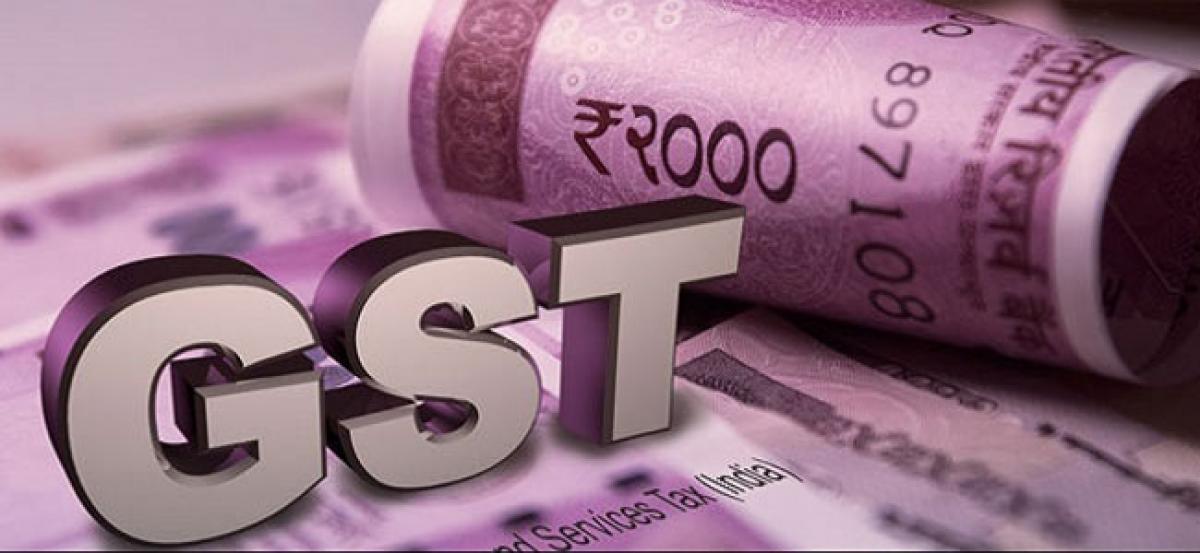Live
- Malaria cases, deaths in India decline by 69pc between 2017-2023: WHO
- ED raids three places in Bengal in online forgery scam case
- Manchu Manoj Questioned by Police Amid Family Dispute
- Bengaluru: IMD Issues Yellow Alert Amid Upcoming Rainfall
- Manchu Vishnu Addresses Media, Clarifies Incident Involving Mohan Babu
- HPCL inks pact with Sea6 Energy to convert seaweed biomass into fuels
- Numaish 2025: Hyderabad’s Grand Exhibition Kicks Off in January – All You Need to Know
- There will be opportunities from every crisis, says CM Chandrababu at collectors' conference
- Women now own 20.5 pc of MSMEs in India, startups surge in tier 2 and 3 cities
- 9 in 10 Indian firms say cloud transformation fuelling AI adoption: Report
Just In

As GST comes into force in the country from Saturday, the State government has begun a massive exercise to revise the Budget 2017-18 outlay, presented in March this year. The development comes as the cost of many development programmes are set to escalate under the impact of the new tax structure.
Hyderabad: As GST comes into force in the country from Saturday, the State government has begun a massive exercise to revise the Budget 2017-18 outlay, presented in March this year. The development comes as the cost of many development programmes are set to escalate under the impact of the new tax structure.
Highlights:
- Finance Department embarks on a task to estimate the additional burden on each project
- Officials have already realised that cost escalation of project cannot be avoided because of tax on raw material at higher slap
The total budget outlay for this financial year was put at Rs 1,49,646 crore. The committed expenditure for salaries, pensions, etc. had been pegged at Rs 61,607.20 crore, while expenditure under ‘Pragati Paddu’ (expenditure on schemes) is
Rs 88,038.80 crore.
State Finance Department has now been entrusted with the responsibility of conducting a detailed study on the implications of GST on every State and Centrally-sponsored schemes and the possibility of cost escalation of each project and revising the allocations accordingly.
The State government had already pleaded with the Centre to exempt government flagship programmes like Mission Kakatiya, Mission Bhagiratha, Irrigation and road works, etc. from GST purview to arrest the cost escalation. But the Union government turned a deaf ear to the pleas.
Top officials of State Finance department told The Hans India that government had realised that the cost of almost all infrastructure development schemes would increase as the tax on raw material was fixed at high slab.
Under the GST, the estimates of the proposed Irrigation projects, road development works, construction of buildings for the sanctioned new schools, colleges and universities, MLA camp offices, integrated district headquarters in the new districts, infrastructure development in Urban Local Bodies (municipalities) and panchayats should be completely revised, sources said.
The plan to construct multi-speciality projects and upgradation of tertiary, secondary and all primary health care centres in the State would also put financial burden on State in the one nation, one tax structure.
The Detailed Project Reports for the Centrally-sponsored national highway projects and road development in extremist affected districts would also be revised, according to sources.
Apart from this, scrapping of VAT would cause loss to the State exchequer immediately. Stamps and Registration Department had stopped collecting 1.25 per cent VAT on every registration of the constructed property. The government has no clue how to overcome the revenue loss, it is felt.
Similarly, government is offering VAT exemption to every prospective investor, who comes forward to set up industries in Telangana State. under the ambitious TS-IPASS industrial policy. After revoking the VAT system, government will have to find alternative mode of incentives to offer to the prospective industrialists.
Taking all these issues under active consideration, the Finance Department in consultation with other departments is reviewing the budget proposals for every scheme that was mentioned in 2017-18 budget proposals.
As the first quarter of the current financial year came to an end by June 30, officials said the revised estimates would be finalised by the end of second quarter and execute the project depending on the availability of financial resources. Chief Minister K Chandrashekar Rao is likely to hold a high-level meeting on the revision of budget estimates for all schemes by July-end.
By Patan Afzal Babu

© 2024 Hyderabad Media House Limited/The Hans India. All rights reserved. Powered by hocalwire.com







